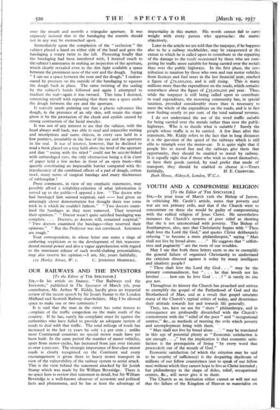OUR RAILWAYS AND THE INVESTORS
[To the Editor of THE SPECTATOR.] SIR,—In his article on finance, "Our Railways and the Investors," published in The Spectator of March 5th, your contributor, Mr. Arthur W. Kiddy, hardly gives an impartial review of the recent speech by Sir Josiah Stamp to the London Midland and Scottish Railway shareholders. May I be allowed space to make one or two comments ?
It is said that the man in the street has some reason to ,omplain of the traffic congestion on the main- roads of the country. If he has, surely his complaint must lie against the authorities who have failed to provide an adequate system of roads to deal with that traffic. The total mileage of roads has increased in the last 25 years by only 1.5 per cent.; unlike most Continental countries no special motor roads have yet been built. In the same period the number of motor vehicles, apart from motor-cycles, has increased from just over 100,000 to over 2,000,000. The strategic importance of first-class motor roads is clearly recognised on the Continent and every encouragement is given there to heavy motor transport in view of the vulnerability of the railway system to aerial attack. This is the .view behind the statement attacked by Sir Josiah Stamp which was made by Sir William Beveridge. There is no space here to review that statement in detail, but Sir William Beveridge is a well-known observer of economic and political facts and phenomena, and he has at least the advantage of
Impartiality in this matter. - His words cannot -fait to carry weight with every person who approaches the matter objectively.
- Later in the article we are told that the takPayer, if he happens also to be a" railway stockholder,' may be eitasperated at the extent to which he is called upon to contribute to the repairing
of the daniag-e to the roads occasioned by those who are com- peting for traffic more suitable for being carried over the metals than over the public highways. In the first place, the Con- tribution to taxation by those who own and run motor vehicles from licences and fuel taxes in the last financial year, reached a figure of L-7z,000,000, and is still rising. This is Many millions more than the expenditure on the roads; which remains somewhere about the figure* of £55,000,00ô. per year. Thus, while the taxpayer is still being called' Upon to contribute to road expenditure, the motoring community has, in Special taxation, provided considerably more thin is necessary to meet the whole of the expenditure on the roads, mid is in fact now finding nearly to per cent, of the total national revenne.
I do not understand the use of the word traffic suitable for being carried over the metals rather than over the public highways. . Who is to decide what is suitable ? Surely the people whose traffic is to be carried. A few lines .after this statement, Mr. Kiddy refers to the fact that in long distances it is the question of the speed of the railways which is still able to triumph over the motor-car. It is quite right that if people like to travel fast and the railways give them that opportunity, they should be enabled to travel by railway. It is equally right that if those who wish to travel themselves, or have their goods carried, by road prefer that mode of transport, they should be enabled to choose ii.:--Yours
Bush House, Aldwych, London, W.C.2. •




































































 Previous page
Previous page